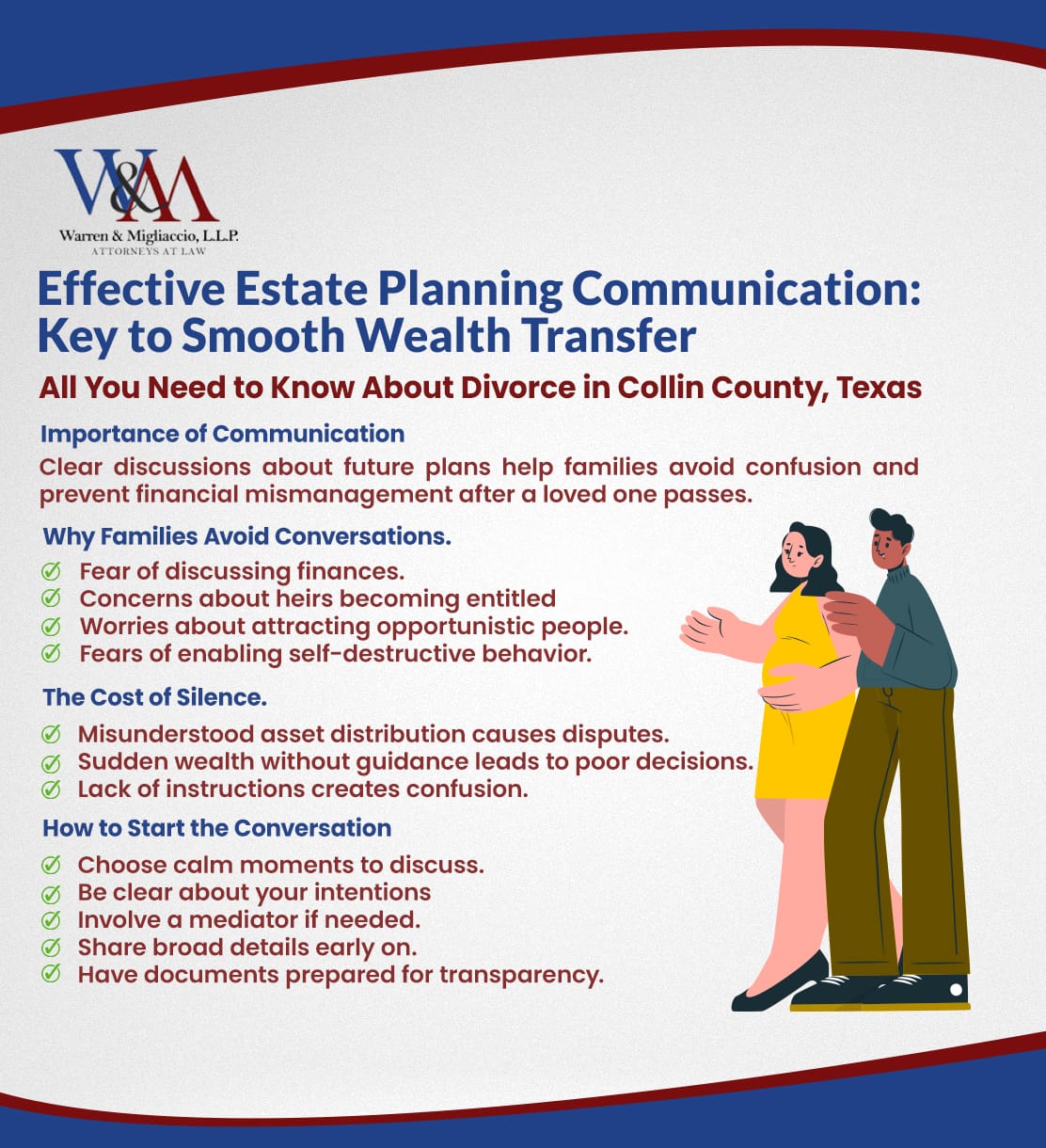Have you ever wondered why some families navigate wealth transfers smoothly? What separates them from those tangled in conflict after a loved one passes? It often boils down to something simple: robust estate planning communication.
This might sound straightforward, but it’s an area many families sidestep. Talking about plans for the future avoids family discord. Many believe that wealth, retirement planning, or even end-of-life preferences are impolite subjects to discuss.

Why Families Avoid Talking About Future Plans
It’s a challenge. Many find it difficult to discuss these matters with their loved ones. What are the most common hurdles that keep families from these important conversations?
- Feeling it’s impolite to discuss finances.
- Worries that heirs may become lazy or entitled.
- Concerns about attracting opportunistic people.
- Fears assets will be used to fuel self-destructive habits.
These fears are not unfounded, as many inheritors lack the financial literacy to handle sudden wealth. As Reuters notes, some recipients buy a new car within 19 days of receiving an inheritance. Overcoming these anxieties starts with recognizing the need for open dialogue and being able to message effectively.
The High Cost of Silence in Estate Planning
It is critical to realize failing to discuss estate plans may have significant financial repercussions. Many planning pitfalls can be prevented through active estate planning communication. When the topic of family circumstances are a secret, practical issues will emerge.
Sarah Daya, an executive director at a major financial institution, highlighted in a report that communication breakdowns are a major factor in wealth transfer breakdowns. This leads to damaged relationships among family members. Over one-third of wealth transfers fail, eroding not just financial assets but familial bonds.
Examples of Miscommunication Costs
Let’s see. Many common scenarios highlight these potential issues when families keep mum about such things:
- Unprepared heirs: Imagine children suddenly inheriting a substantial portfolio. What happens if they have zero clue how to manage wealth, including paying estate taxes? It might dwindle through mismanagement or poor decisions.
- Family discord: Unequal distribution of assets without explanation causes issues. For instance, if one child gets the lake house and the others don’t understand why. Resentment breeds when intentions aren’t explained, especially with blended families where different sets of children exist, or perhaps adult children are involved from previous relationships. See how estate planning may work with a second marriage or stepchildren to consider.
- Unclear Roles: No successor is set in the plans. Without communicated instructions or knowledge about where documents are kept, the situation can become an administrative and logistical mess for people, requiring a quick financial decision.
These challenges emphasize the need for estate planning communication. A frank talk can clear up assumptions and prep everyone involved to ensure family member understands family future plans.
How To Start The Conversation About Wealth Planning
Where do you begin with this awkward topic? What is the path to engaging everyone constructively? The main object is to establish open family dialogue by being candid in a relaxed setting, this includes your long term wishes.
- Pick the Right Time: Try discussing things in calm settings rather than at stressful times. Do this to enable everyone to talk freely without pressure. This will make sure that each family member understands family future plans.
- Be Clear About Intentions: Assure your family your motive is planning the family legacy and safeguarding the future of each member by communicating estate. Help the family understand that future plans require the input of more than just one individual.
- Involve a Mediator: Estate planning attorneys and financial advisors facilitate healthy discussions. They have the insights to assist with sensitive matters in a way all parties find respectful and understandable. Trusted advisors can present an neutral outlook, helping focus conversation objectively, not emotionally.
- Share the Game Plan Early On: Don’t overwhelm everyone with details right away. Discuss broad strokes first like naming an executor and guardianship arrangements. This allows adjustment, and to ease the way into more nuanced topics progressively, promoting a helpful approach.
- Have Estate Planning Documents Prepared: Disclosing your estate planning documents helps avoid suspicion by clearly outlining your wishes. This transparency reduces the risk of misinterpretations, resentment, or even potential legal disputes in the future. If any adjustments are needed, having well-documented plans in place ensures that changes are clearly understood.
The Role of Your Trusted Advisor in Family Estate Communication
Many see having estate plans and trusts. Who is most responsible? A common misconception involves delegating entirely to only one party such a relative, but this act invites dispute for many reasons.
Designating responsibilities necessitates choosing executors and trustees ready to execute duties ethically, respecting family member dynamics in balance to legal statutes according trust terms laid through different means such wills. It remains advisable to engage with professionals in advisory roles who support and respect all perspectives while mediating conflict if tensions emerge. These third parties understand regulations impacting beneficiaries today.
You may ask an estate planning attorney what to communicate to ensure things go smooth later for your family’s situation. Legal parameters exist concerning trusts, probate challenges or tax consequences so experienced insight prevents misunderstandings. It enables all heirs through their time, also helping them with a quick financial decision.
Area |
Why It’s Needed |
Discussion Tips |
|---|---|---|
| Wealth Expectations | Ensure all heirs understand financial picture and prevent surprises or entitlement attitudes. | Clearly reveal income values instead hiding aspects but also promote savings culture over relying wealth as resource entirely. |
| Roles Assignments | Prevent disputes as roles of caretakers are established in legal context according ethical guidance and expectations for duties. | Verify selected can fill needs by getting opinions over their suitability to assume key mandates. Ensure second persons is in plan. |
| Legacy Meanings | Unite heirs past financials discussing future missions, values plus intended impacts towards long success after generational wealth. | Share personal past to establish motivations from work rather handing all suddenly after demise with lack direction, meaning. |
These tables display many steps people ignore in their existing planning, even today. Families could use them today while evaluating plans, giving direction beyond finances, aligning personal family value goals within financial arrangements. The above tips should avoid those planning pitfalls families must consider to achieve objectives together across future timelines by communicating the plans.
Handling Complex Family Dynamics Through Estate Plan Disclosure
Navigating Digital Assets in Estate Planning Discussions
As we move deeper into the digital age, it’s important to consider how digital assets will be managed as part of estate planning. Everyone needs to plan for their “digital legacy,” which includes managing online accounts, investments, banking, and other digital records. Without clear communication and updated plans, families could face stress and uncertainty when accessing these critical resources after someone passes.
Planning for digital assets involves ensuring that loved ones have access to necessary accounts and credentials. Discussing logins, passwords, and who will manage digital assets is essential. If no one is designated to manage these areas, there could be loss of access, creating confusion and hardship.
Create a digital asset plan that includes clear instructions for accessing important data. Store this information securely, and back it up in a way that loved ones can access if needed. This will make it easier to retrieve important digital information, even if physical records are no longer accessible.
In family discussions about estate planning, honesty and transparency are key. Bringing these topics up early, with the help of advisors if needed, will ensure that everyone understands their role and responsibilities. This process helps establish a clear path for preserving the legacy and managing the estate according to your wishes.
Effective communication is especially critical when transferring wealth from one generation to the next. Honest conversations and a solid plan will make it easier for your loved ones to carry out your wishes and protect your legacy. Start planning now, and adjust your plans as needed to reflect changes over time. By doing so, you can ensure a smooth transition and preserve your assets for future generations.

Clear communication about estate planning helps prevent family disputes and ensures a smooth wealth transfer.
FAQs about estate planning communication
Conclusion
Solid estate planning communication can prevent family division after you are gone. Be open. Clarify expectations, and involve a support team as necessary to guide discussions respectfully for you and family success with goals over wealth, inheritance, family situations or any relative points through intent which aids integrity through ethics from that given data over periods ongoing after everything occurs plus after loved family’s legacy remains.
By using advice, people take into those various requirements. Plus feel assured any and all gets looked upon from advisors, knowing future has security knowing “plans shall perform right through those eras given today planning measures”. Make sure your plans don’t fall and family members can be a part of it. Don’t feel uncomfortable when discussing future plans to have that successful families talk that are needed.
